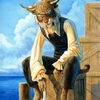Which was Peter the Great responsible for? reforming Russia and making it a republic giving power to Russia's highest ranking noblemen turning Russia into a modern, powerful nation following a policy of peace with Russia's neighbors
Answers (2)
Know the Answer?
Not Sure About the Answer?
Find an answer to your question 👍 “Which was Peter the Great responsible for? reforming Russia and making it a republic giving power to Russia's highest ranking noblemen ...” in 📗 English if the answers seem to be not correct or there’s no answer. Try a smart search to find answers to similar questions.
Search for Other Answers
You Might be Interested in
How is a generalization used in literature? a. to explain something complicated with a simple statement b. to give a hint or clue about what will happen in a story c. to offer a conclusion based upon gathered research d.
Answers (1)
How do setting, time, and sequence impact the audience's understanding of the plot?
Answers (1)
Writing that distorts the truth for evil purpose is referred to as what
Answers (2)
What is one chracteristic of journals and diaries that makes them more personal than other narratives?
Answers (1)
How would a character who is experiencing internal conflict feel? a. enthusiastic b. affectionate c. decisive d. confused
Answers (1)
New Questions in English
A participle is a verb acting as a (n) ___. adjective adverb noun
Answers (1)
What is * a rhyme scheme or meter * figurative language * at least one verb in the subjunctive mood
Answers (1)
5. Look up monody in a dictionary. In your own words, give at least two definitions of the term. Then review the context of the word's use in "The Bells" and state which meaning Poe most likely intended.
Answers (1)
What appeals to reason do you find in jackson speech
Answers (1)
What is a good thesis statement contain?
Answers (1)

